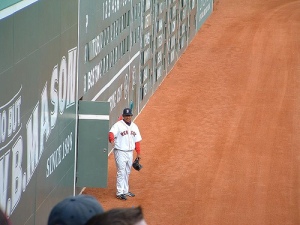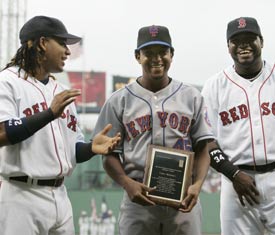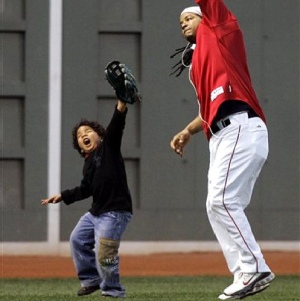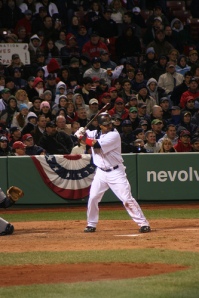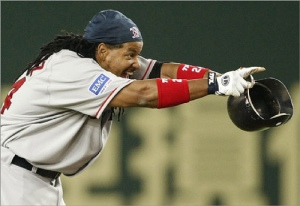 I started playing online fantasy baseball in about 1995 or so, and it’s now an annual tradition. Draft day has become a holiday on my calendar and is as eagerly anticipated as any day of the year. This year’s draft — my son’s first — will go down in history as my favorite of all-time, for it demonstrated the emotional hold that our beloved Red Sox players have over us, especially when we’re kids.
I started playing online fantasy baseball in about 1995 or so, and it’s now an annual tradition. Draft day has become a holiday on my calendar and is as eagerly anticipated as any day of the year. This year’s draft — my son’s first — will go down in history as my favorite of all-time, for it demonstrated the emotional hold that our beloved Red Sox players have over us, especially when we’re kids.
A Co-Manager Comes of Age
The last two years, my almost-nine year-old son has “co-managed” my fantasy baseball team with me (I’m in a 12-team Yahoo! league with my brothers, sister, father, and several close friends). The main impact of his co-management has been the reliable presence of Nomar Garciaparra on the roster and also in the starting lineup whenever he has been healthy. (“Daddy, put Nomar back in the lineup!”) Although my son was only five years old when Nomar was traded, #5 remains a god in our house.
 This past fall, my son managed his own fantasy football team against his dad, uncles, aunts, and grandparents and WON the league. He established himself as a draft wizard, grabbing Peyton Manning, Randy Moss, and Adrian Peterson with his top three picks. So, riding a wave of pride and optimism, in February he asked to manage his own fantasy baseball team. Confident that he was ready to compete with the big boys, we expanded the league to 13 teams.
This past fall, my son managed his own fantasy football team against his dad, uncles, aunts, and grandparents and WON the league. He established himself as a draft wizard, grabbing Peyton Manning, Randy Moss, and Adrian Peterson with his top three picks. So, riding a wave of pride and optimism, in February he asked to manage his own fantasy baseball team. Confident that he was ready to compete with the big boys, we expanded the league to 13 teams.
The Draft: Peavy or Beckett? Sizemore or Ramirez?
We bought all the fantasy baseball magazines and studied them closely for a month. The day of the draft (7:30pm start time), I hurried home from work to be sure he was ready, and when I arrived, I was treated to a wonderful sight. He had created an information cockpit for himself at the computer. Surrounding his seat on all sides were stat sheets, handwritten draft lists for every position, articles about sleepers and busts, and various pages ripped out of magazines. “Daddy, I know who I’m going to pick if I get the first pick,” he proclaimed eagerly. “Jake Peavy!” (Peavy scored the most points in our league last year — so he was a logical choice.)
A few minutes later, the draft order was revealed on our Yahoo! draft site. My son had pick #3, and I had pick #4. “I really hope Peavy will still be there at number three!” he prayed. I set up shop at my laptop in a room adjacent to his cockpit.
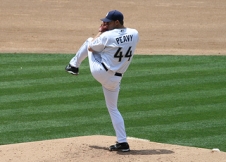 At 7:30pm sharp, the draft went live. Suddenly, A-Rod was gone. “Yes! He took A-Rod!” The second pick was… Jose Reyes. And the clock started ticking on my son’s pick, number three. He had 90 seconds to click on Jake Peavy. But he froze. Pick Peavy, I urged. “I don’t know, Daddy,” he said, struggling with a decision. “Maybe I want Josh Beckett.” Peavy’s a great pick, Beckett’s a great pick, I told him. 20 seconds left. Make your pick! “I want Josh Beckett.” Click.
At 7:30pm sharp, the draft went live. Suddenly, A-Rod was gone. “Yes! He took A-Rod!” The second pick was… Jose Reyes. And the clock started ticking on my son’s pick, number three. He had 90 seconds to click on Jake Peavy. But he froze. Pick Peavy, I urged. “I don’t know, Daddy,” he said, struggling with a decision. “Maybe I want Josh Beckett.” Peavy’s a great pick, Beckett’s a great pick, I told him. 20 seconds left. Make your pick! “I want Josh Beckett.” Click.
Emotion trounced Analysis. How great is that??
Fast forward to the second round. My son had spent the rest of the first round studying his notes to figure out who to take next. “If he’s still available, I’m going to take Grady Sizemore with my second pick,” my son announced. Good choice, I assured him. Then came his turn to draft. And he froze. Pick Sizemore, I urged. “Daddy, do you think I should take Grady Sizemore or Manny Ramirez?” he asked. You’ll be able to get Manny in the next round, I assured him. Go for Sizemore this round. “Don’t tell me what to do!” he said curtly. And suddenly, Ramirez was Beckett’s fantasy teammate.
Emotion 2, Analysis 0.
Let’s jump to the third round. “I think I’m going to take Jonathan Papelbon,” he said. “Do you think that’s a good pick, Daddy?” He’s a great player, I told him, but no one’s going to pick a closer until the fifth round at the earliest. You can get him in a later  round. “Don’t tell me what to do!” Click. Papelbon joined his Red Sox teammates on a roster that was looking more and more like a tribute to the posters on my son’s walls.
round. “Don’t tell me what to do!” Click. Papelbon joined his Red Sox teammates on a roster that was looking more and more like a tribute to the posters on my son’s walls.
Emotion 3, Analysis zilch.
Fourth round — analysis had been totally abandoned and emotion had taken over. He wanted to pick Dustin Pedroia but I convinced him that Mike Lowell would be a better pick. And in the fifth round, he picked his first non-Red Sox player: Torii Hunter. By the end of the draft, his team included Tim Wakefield, Johnny Damon, and of course, our favorite player of all time, Nomar Garciaparra (secured with his 24th, and final pick).
Clearly, my son drafted a good team. With Beckett, Ramirez, Papelbon, and Lowell anchoring his roster, he’s got as good a shot as anyone to win the league. But I’ll always remember all the research he did, all the logical planning and rational reasoning his left brain performed, and how the loyalty and emotion of his right brain – the side that loves the Red Sox – swooped in at those moments of truth and buried his analytical, stat-focused left brain. He’s eight. What a fantastic age to be a Red Sox fan!
And for the record, my first pick (#4 overall) was Johan Santana, and the only Red Sox player I secured was Coco Crisp. (My left brain is counting on him being traded, batting leadoff for a National League team, and winning the N.L. batting title…..)

